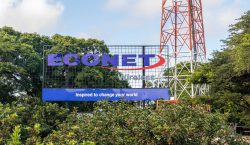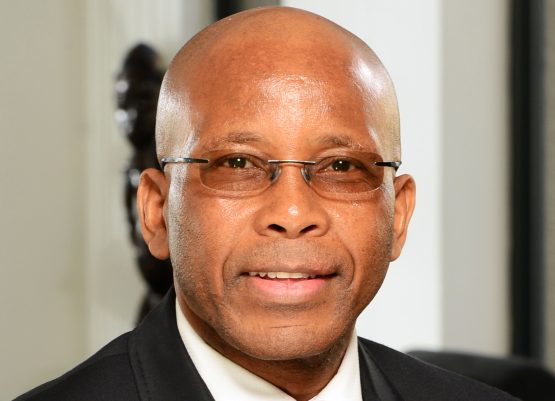

In his book Truth to Power, former Eskom CEO André de Ruyter detailed how several mafias were looting the state-owned utility on an industrial scale.
They went by cartel names like “Presidential”, “Mesh-Kings”, “Legendaries” and “Chief” – each focused around a particular power station. At Kusile power station, the going rate for falsifying delivery notes for quality coal was R200 000.
“We have not seen evidence of mafias as a board,” says Eskom chair Mteto Nyati, speaking to Ann Bernstein, executive director of the Centre for Development and Enterprise at a media presentation on Tuesday.
Nyati was responding to a question regarding De Ruyter’s claims of mafias operating inside and outside the organisation.
“There are systemic issues such as fraud,” he added. “We’ve gathered so much information to the point we can say there are no mafias [at Eskom].
“We can say there are corrupt individuals within Eskom. There are also connections to corrupt people outside. However, the majority of employees are honest.”
Identifying the bad apples
Eskom uses a data-based approach to identify corruption and fraud and collaborates with law enforcement offices such as the Special Investigating Unit (SIU).
The anti-fraud campaign uses AI and other technologies linked to its SAP enterprise software, supported by company data from the Companies and Intellectual Property Commission (CIPC), car auctions, the Deeds Office and other sources.
There was a tendency to suspect everyone at Eskom, but this data-based approach allowed it to identify and focus more narrowly on the corrupt individuals still attempting to loot the organisation.
This is part of a nine-point strategy intended to drive the power utility’s turnaround and end load shedding.
Among the nine systemic issues identified as priority areas were load shedding, spiralling debt, corruption, transitioning into new forms of energy, and a dysfunctional corporate culture with no real link to employee performance.
There have been material improvements in all focus areas, says Nyati.
Turning the corner
After eight months without load shedding, is Eskom becoming the poster child for state-owned enterprise (SOE) turnaround?
Where its previous boards were stacked with political cadres, they are now filled by engineers, accountants and sector specialists.
This has been a key factor in the changing corporate culture, and a major reason for Eskom’s ability to go eight months without load shedding.
Nyati believes there are lessons here for other state-run organisations, including municipalities and schools.
“Our big problem is leadership,” he says. “Where it exists you can see it in terms of results. Municipalities – it’s a failure of leadership.
“There are also those doing very well, such as Midvaal,” he adds.
“Hospitals are highly complex to run. You’re managing people and logistics and you cannot do this without professional management.
“It’s the same with schools. Some rural schools do well, why? It starts with the headmaster,” says Nyati.
“We have a culture of being too respectful, of not holding each other accountable. We don’t question things. The leaders arrive and we smile rather than ask the right questions.”
Some boards meet once a quarter, which is not sufficient when an organisation is in crisis.
Eskom had torn through 13 CEOs in 13 years by the time De Ruyter took over. It was time to settle things down and work systematically through the issues that had turned Eskom from one of the world’s most highly-rated electricity utilities in 2001 to one of the worst 20 years later.
The problem identified at Eskom was not so much an ageing fleet of power stations, but a lack of maintenance and not following standard operating procedures. A car will run for decades if it is properly maintained, and the same is true of Eskom’s older power stations.
Nytai heaped praise on the late minister of public enterprises, Pravin Gordhan, and current Electricity and Energy Minister Kgosientsho Ramokgopa.
They assisted in arranging exemptions for Eskom from certain environmental, black economic empowerment (BEE) and other regulations that made it difficult to function at the height of load shedding.
Eskom was then able to establish direct relationships with original equipment manufacturers to service plants and train its staff rather than go through middlemen.
Could other SOEs apply for similar exemptions from BEE and environmental regulations?
The solution, says Nyati, is to opt for evidence-based policies that drive inclusive growth.
Debt
De Ruyter highlighted how middlemen were charging R80 000 for knee pads that could be bought for R150. It was a similar story for every kind of consumable item.
This helps explain how debt rocketed from R40 billion in 2007 to R483 billion by 2020.
That prompted government to extend a R254 billion debt relief plan over three years. Its debt currently stands at about R400 billion.
Then there’s the nearly R80 billion owned by municipalities to Eskom.
The debt issue has less sting now that load shedding is over. An immediate saving of R33 billion in diesel burned in 2023 to keep power generation going can now go to paying down debt. The government’s debt relief package also reduces interest payable.
Eskom ‘not in a death spiral’
Nyati rejects the argument that Eskom is a utility in a death spiral, with few customers and mounting debt.
“We have let South Africans down, so a lot of people want us to disappear,” he admits.
“Even the story of this turnaround does not sit well with them.”
Now businesses are asking if the turnaround at Eskom is sustainable, and whether they should shelve their alternative energy plans and deploy that capital more efficiently elsewhere.
“People want Eskom to be there, to be reliable and affordable. Our next challenge is affordability, driving down our own costs, and shifting to renewables,” says Nyati.
Eskom was previously shrinking itself out of existence. Now it plans to embrace renewable energy and build a future pipeline of business.
“At end of life of each power station, we would shrink,” says Nyati.
“I asked what kind of a strategy is that? We agreed as a board that we will participate in renewables. No other company in SA has the kind of skills that we have, so bring on the competition.
“We have transmission lines, and we have land where we can move into greener energy.”

‘We have a culture of being too respectful’ instead of asking the right questions, says Eskom chair Mteto Nyati. Image: Supplied
— moneyweb.co.za